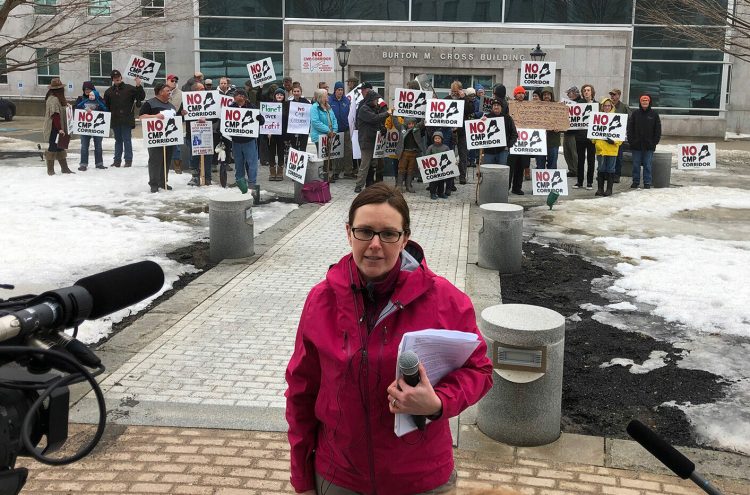AUGUSTA — Opponents of Central Maine Power’s proposal to build a high-voltage transmission line through Maine urged lawmakers to order state environmental regulators to consider the project’s impacts on greenhouse gas emissions.
Dozens testified on both sides of a bill that would direct the Department of Environmental Protection to study the “total net effect” on greenhouse gases of CMP’s controversial proposal to build the 145-mile transmission line through western Maine. The New England Clean Energy Connect proposal would allow Massachusetts to purchase power from Hydro-Quebec as part of a state law requiring the Bay State to switch to renewable sources.
But skeptics of those clean-energy claims suggest Hydro-Quebec could merely shift existing power generation to Massachusetts without reducing greenhouse gas emissions. Meanwhile, Maine residents would be forced to deal with the ecological and economic impacts of a 145-mile power line corridor cutting across the mountains, lakes and river valleys of western Maine, critics said.
“There is a lot at stake here: Global warming is a serious issue but so is maintaining our natural environment,” said Daryl Kelley, a registered Maine Guide from Portland whose great-grandfather was a trapper and former game warden in the corridor area. “We need some real answers to this whole project. If what CMP is telling us is true with the corridor, they shouldn’t be afraid of an independent study.”
But project backers said the proposed study is unnecessary, given evidence on greenhouse gas emissions already presented to state regulators. And they warned that any new regulatory requirements would only delay a project that would create thousands of construction jobs and benefit the tax base of communities along the corridor.
“In my view, based on painful decades of regulatory experience in Maine, you are looking at six months to a year of extending DEP proceedings in Maine … and the tragedy there, as my testimony points out, is the fear is not justified by the facts,” said Tony Buxton, an attorney representing the trade organization the Industrial Energy Consumers Group.
CMP’s transmission line proposal has emerged as Maine’s most controversial land-use fight in a decade.
Numerous towns along the proposed corridor have come out against the project, despite a $258 million incentives package that includes benefits for host communities. Those financial incentives helped win Gov. Janet Mills’ support for the project – which would be paid for by Massachusetts ratepayers – but have done little to suppress the opposition.
“We’ve seen tens of thousands of Mainers who are very concerned about the massive permanent scarring that this corridor would present,” Sandra Howard of Carratunk, director of the Say NO to NECEC organization, said during a rally of project opponents at the State House on Friday. “It also would be harmful to Maine’s environment and waterways.”
The project is under review by the DEP, the Maine Public Utilities Commission and the Land Use Planning Commission. On Friday, however, Howard and other critics seized on the issue of greenhouse gas emissions as their latest front of attack against the project.
The bill, L.D. 640, would require the DEP or a consultant hired by the department to “review all relevant, verifiable evidence and issue a report on the total net effect on greenhouse gas emissions” from the project. The bill sets a deadline of June 1 and directs the DEP to consider the study’s findings as part of the application review.
“There are plenty of reasons to be skeptical about whether the project would, in fact, reduce greenhouse gas emissions,” said bill sponsor Sen. Brownie Carson, D-Harpswell. “One might think that we would know the answer to this by now but, unfortunately, we do not. We don’t because a credible, independent assessment of this issue has not been done.”
But a representative for CMP’s parent company, Avangrid Networks, as well as other project backers, pointed to a report for the PUC by London Economics International and two others showing greenhouse gas emission reductions in New England.
“There has been extensive time spent at the PUC addressing this issue, including the testimony of three independent experts,” said Thorn Dickinson of Avangrid Networks. “And in that record, the analysis clearly demonstrates that NECEC will reduce carbon emissions by 3 million metric tons per year.”
Ben Dudley, director of the organization Mainers for Clean Energy Jobs, pointed out that Carson’s bill would create a new regulatory review standard for a single project. Yet the bill offers DEP staff no criteria for incorporating the study’s results into their analysis of the project.
“It proposes an 11th hour disruption to well-established permitting policies that carefully balance the diversity of public interests,” said Dudley, whose organization’s members include the Maine State Chamber of Commerce and companies hoping to help build the corridor. “The regulatory permitting processes the Legislature has delegated are justified, in part, to insulate decisions from political pressure. This bill circumvents that insulation.”
But Nick Bennett, staff scientist at the Natural Resources Council of Maine, said Maine residents deserve to know if the project will reduce greenhouse gas emissions considering the environmental impacts of a 145-mile transmission line. Bennett also pointed to testimony in Massachusetts’ regulatory process from the office of the state’s attorney general suggesting that electric generation using fossil fuels may increase elsewhere if Hydro Quebec diverts a large amount of electricity to Massachusetts.
“That’s why we need this study because we need to get to the bottom of this,” Bennett said.
Hydro-Quebec has not formally participated in the regulatory process and did not send a representative to address lawmakers Friday.
Send questions/comments to the editors.



